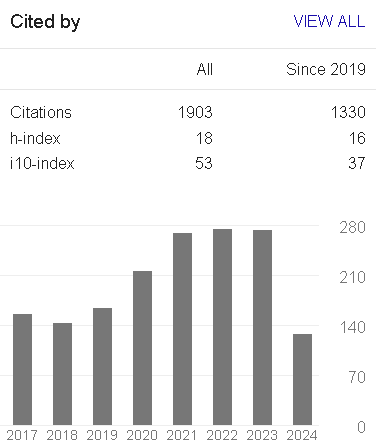Security threats analysis of wireless local area network
Keywords:
Network Security, Security Protocols, Wireless Network, WPA2, Wi-Fi, Network AttacksAbstract
There is a geometric growth in the manufacturing and sales of wireless network devices presently. This growth is not connected with the advantages ushered in by wireless network e.g user mobility, the flexibility of the network, enable network connection for different kinds of devices, increased productivity, etc. However, because the wireless network is broadcast in nature, it has numerous security challenges, if these security challenges are not addressed, different attacks can be lunged against the network such as theft of data, unauthorized access to the network, denial of service, etc. These security challenges are caused majorly by the body implementing the data confidentiality protocol and the wireless device users. Nowadays, almost all wireless access points (APs) are secured with Wi-Fi Protected Access 2 (WPA2) because hitherto WPA2 is known to provide the highest form of security to wireless local area network (WLAN). Consequently, we investigated various wireless network security protocols, focusing more on WPA2 since it is the latest amongst the protocols. Real-time dictionary attack against WPA2 was carried out to prove the existence of flaws in the protocol. Hence, countermeasures were proposed to forestall these flaws in the system and; if the suggested measures are implemented, it will lead to the development of a more secure wireless network.
References
Choi, MK, Robles,R., Hong, CH and Kim, TH “Wireless Network Security: Vulnerabilities, Threats and Countermeasure”, International Journal of Multimedia and Ubiquitous Engineering, Vol. 3, No. 3, (2008), Pg.. 77 – 86.
Abiona, O., Oluwaranti, A., Oluwatope, A., Bello, S., Onime, C., Sanni, M and Kehinde, L. “Wireless Network Security: The Mobile Agent Approach”, International Journal of Communications, Network and System Sciences, 6, (2013), Pg. 443 – 450
Prodanovic, R and Simic, D. “A Survey of Wireless Security”, Journal of Computing and Information Technology – CIT, Vol 15, No 3, (2007), pp. 237 – 255
Orukpe, P.E., Erhiaguna, T.O and Agbontaen, F.O. “Computer Security and Privacy in Wireless Local Area Network in Nigeria”, International Journal of Engineering Research in Africa, Vol 9, (2013), Pg. 23 – 33
Wikipedia, “Wired Equivalent Privacy,”https://en.m.wikipedia.org/wiki/wired_Equivalent_Privacy#Security-details
Guillaume Lehembre, “Wi-Fi security –WEP, WPA and WPA2”, www.hakin9.org
Bilger, J., Cosand, H., Noor-E-Gagan Singh, NEG and Xaview, J. “Security and Legal Implications of Wireless Networks, Protocols and Devices
Sithirasenan, E., Zafar, S and Muthukkumarasamy, V. “Formal Verification of the IEEE 802.11i WLAN Security Protocol”, In Australian Software Engineering Conference (ASWEC 06), Pg. 181 – 190
Vanhoef, M and Piessens, F. “Key Reinstallation Attacks: Forcing Nonce Reuse in WPA2”, 2017.
Eum, SH., Kim, YH and Choi, HK. “A Secure 4-Way Handshake in 802.11i Using Cookies”, International Journal of Principles and Applications of Information Science and Technology, Vol 2, No 1, (2008).
Downloads
Published
How to Cite
Issue
Section
License
Copyright (c) 2018 COMPUSOFT: An International Journal of Advanced Computer Technology

This work is licensed under a Creative Commons Attribution 4.0 International License.
©2023. COMPUSOFT: AN INTERNATIONAL OF ADVANCED COMPUTER TECHNOLOGY by COMPUSOFT PUBLICATION is licensed under a Creative Commons Attribution 4.0 International License. Based on a work at COMPUSOFT: AN INTERNATIONAL OF ADVANCED COMPUTER TECHNOLOGY. Permissions beyond the scope of this license may be available at Creative Commons Attribution 4.0 International Public License.


